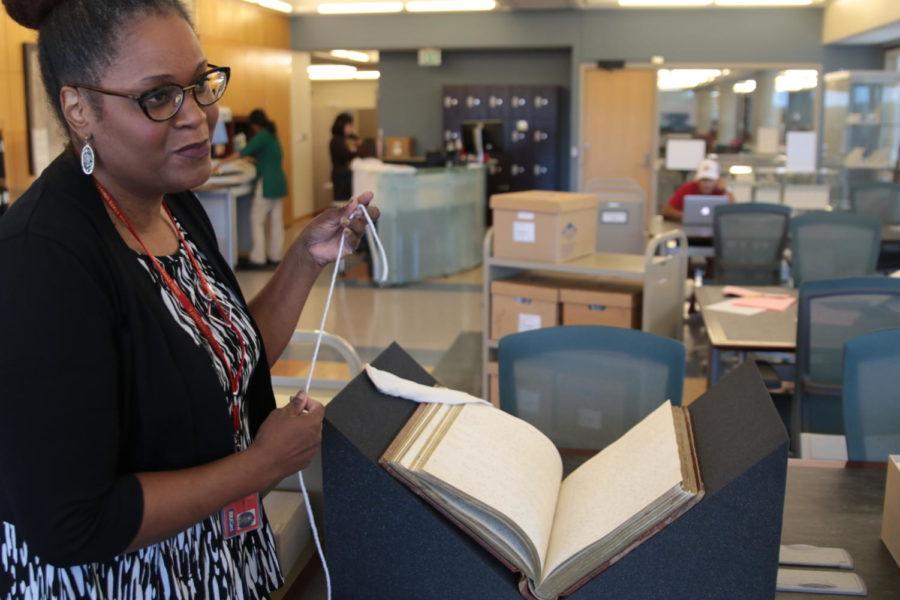Lost history: Q&A with Special Collections and University Archives on lack of representation
Chris Jorgensen/Iowa State Daily
Petrina Jackson is the head of the Special Collections and University Archives at Iowa State.
February 26, 2019
Within Special Collections and University Archives in Parks Library there documents, books, pictures and more, dating back to the first years of establishment of Iowa State.
These materials are preserved in good condition accessible to the public to do research on or just simply view. The University Archives include hundreds of subjects of Iowa State’s history from the first clubs and organizations to the creation of the different colleges
However, there is a concern for lack of information pertaining to student experiences while attending Iowa State, especially from students of color.
In an Q&A with Petrina Jackson,Head of Special Collections and University Archives and Rachael Acheson, Assistant University Archivist, explain the significance of the preservation of Iowa State’s history, specifically in regards to black students on Iowa State’s campus.
Q:How does the Special Collections and University Archives department gain all of this historic material?
Jackson:“There are three different ways in which Special Collections and University Archives department gains these materials: transferring, purchasing or donating. There is also an outreach communicated to different departments today to receive that information.”
Q:Anything that stuck out or was interesting of the documentation of history at Iowa State? Maybe in regards of race, specifically the African-American population?
Jackson: “The most well -known and most abundant information relating to black students is Jack Trice. Other materials relating to black students on Iowa State’s campus or even in Iowa, are few and require one to do deeper research.
Acheson: “Student life in general has historically not been incredibly well documented across different universities. Anything relating to student life are usually documented through statistics or are overwhelmingly white-man centric.”
Jackson: “This is where Rachel’s role comes in as her job is to ensure student life and institutional documents are being included as both areas are needed in Iowa State’s history.”
Q: Why is there a lack of documentation of the African-American student experience at Iowa State?
Jackson: “Depending on the institution, you don’t really see the documentation of people of color in general. What had been documented are usually papers of the powerful, which are usually people in authority like white people, more specifically white men. People that are known as normative or not ‘othered’ are mostly represented in the Special Collections and University Archives. The library field is much more aware of that and creating a movement to change that.”
Acheson: “The library field in general is still very white, but in the past were historically even more so that people did not know of these biases.”
Q: What is alums role in documentation of the history of Iowa State?
Acheson: “There is a common misperception that the University Archives have everything in relation to Iowa State’s history, when in reality it doesn’t. There are ways of getting the material and if people don’t donate them, then they are not included in the archives for students to view.”
Q:Is there any limitations to what can be included in the archives?
Acheson: “There is a common misperception that the University Archives have everything in relation to Iowa State’s history, when in reality it doesn’t. There are ways of getting the material and if people don’t donate them, then they are not included in the archives for students to view.”
Q:Is there any limitations to what can be included in the archives?
Jackson: “It can be whatever of Iowa State, we are here to provide information and the user can interpret that information however they want.”
Q: Is there initiatives or things going on that can enhance the documentation of race on Iowa State’s campus?
Acheson: “This year we have two undergraduate students working on research projects to be published as an online exhibit. The students had the freedom of what topic to research on as long as it related to increasing the transparency of underrepresented history at Iowa State. For the moment it is two students, but we hope to continue this program and continue building on it.”
Jackson: “There is also a Voices of Color Initiative that is in partnership with the Office of Diversity and Inclusion and Parks Library. Through oral histories, this project seeks to document more of the experiences of students of color in specific clubs and organizations. Currently, it is a pilot to hopefully be launched into a website.”
In both their positions, Jackson and Acheson, seek to build the connections between students and the University Archives department.
They are encouraging e organizations and departments to continue documenting and preserving their history, so it then can be donated in the future to the University Archives.
They also hope to continue improving the documentation of student experiences, especially in regards to students of color.
“You too are Iowa State, and your material should be here,” Jackson said.







